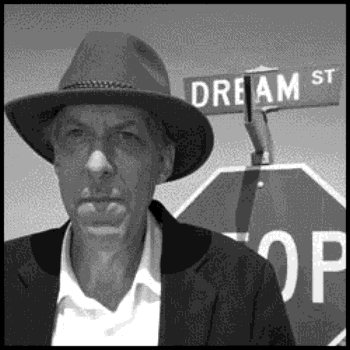Douglas McCulloh
(Icelandia/Heyday)

Building subdivisions sounds hot and boring, but Dream Street is anything but. McCulloh's live (and lively) interviews match his fast action photographs --- rakish angles, funny closeups, ample distortions. It turns the book into a dizzying panorama.
Instead of dubbing his street McCulloh Blvd --- hell, I would have named my street after me --- he opts for "Dream Street" where Young Homes, the developer, took forty acres of strawberry patch and transformed it into 134 tract homes. McCulloh spends the next year or so there, photographing contractors, subcontractors, inspectors, electricians, day-laborers, framers, roofers, neighborhood kids (the ones who used to play in the acreage that is now filled with those trashy homes we love to hate).
Sounds bucolic, no? A home of your own. The American Dream, there on Dream Street. But everyone seems to have a beef. The graders, the framers, the surveyors, the electrician. The latter complains about the way people work, with a not-so-subtle touch of jingoism: "They don't care about quality. They don't want quality and they don't care enough for the American people. All they want is bucks. That's it. They don't give a shit, the builders."
The readers of Dream Street will grow a new vocabulary. "Trusses." "Fascia." "Framing." "Feathering trenches." And the baddest word of them all, "Piecework." It means the developer farms out everything, the work comes back uniformly shoddy. There's someone to do the windows, someone else to do the doors, someone else to stack the tiles on the roof, someone else to do the framing. There's even someone to watch the framers "like hawks." There's even a "framing pimp" who hires the piece-workers.
Framers use nail guns. One of them, Brent, even manages to nail his own hand. We get a photograph of that, too. "I get a nail in me, I ain't gonna stop ... I'm not stopping to get a tetanus shot until I see red coming up the veins on my leg. I need my $120 a day." He's talking about your dream house: complete with blood on it.
What we have here is Studs Terkel's Working without any of the idealism. It goes from the one-eyed bum who McCulloh meets picking through the trash on the first day there to the people who end up buying into the dream. There are the dozens of workers, Young's salesman, the publicity hacks, the night-watchman who protects the last of the unsold houses from vandals. We even visit some crows that fly by in the morning.
It's (mostly) a story of people being worked too hard for too little money --- many are undocumented laborers from Mexico --- but the mix is what makes it interesting. "The stucco guys were lying around sleeping when people in ties came through the houses: Rudy, Gary, and other bigwigs. It wasn't the stucco crew's fault --- the concrete people had snatched the water truck."
- If delay is an art form, Dream Street has the Warhols of stall. When any hitch arises --- a missing water truck, the wrong tool, a late inspection, a hiccup in the temp power --- the underpaid, uninvolved workers are more than happy to take a long break. it has a name: "beer o'clock."
Dream Street. Great name, great concept. The writing (and the photographs) are stark, unsentimental, ultimately turn the dream into a bit of a nightmare. It is a quick history of the home-building trade and how it has been transformed into a people-eater. Especially when McCulloh throws in casual asides, like the poison in the ground-water; the everpresent, nonchalant hatred for "los undocumentados;" and, most of all, the revelation that those who build these houses "would never buy a Dream Street home ... All agreed that the average home buyer didn't have a clue."
- The painters said they'd rather live in a wreck as long as it had character.